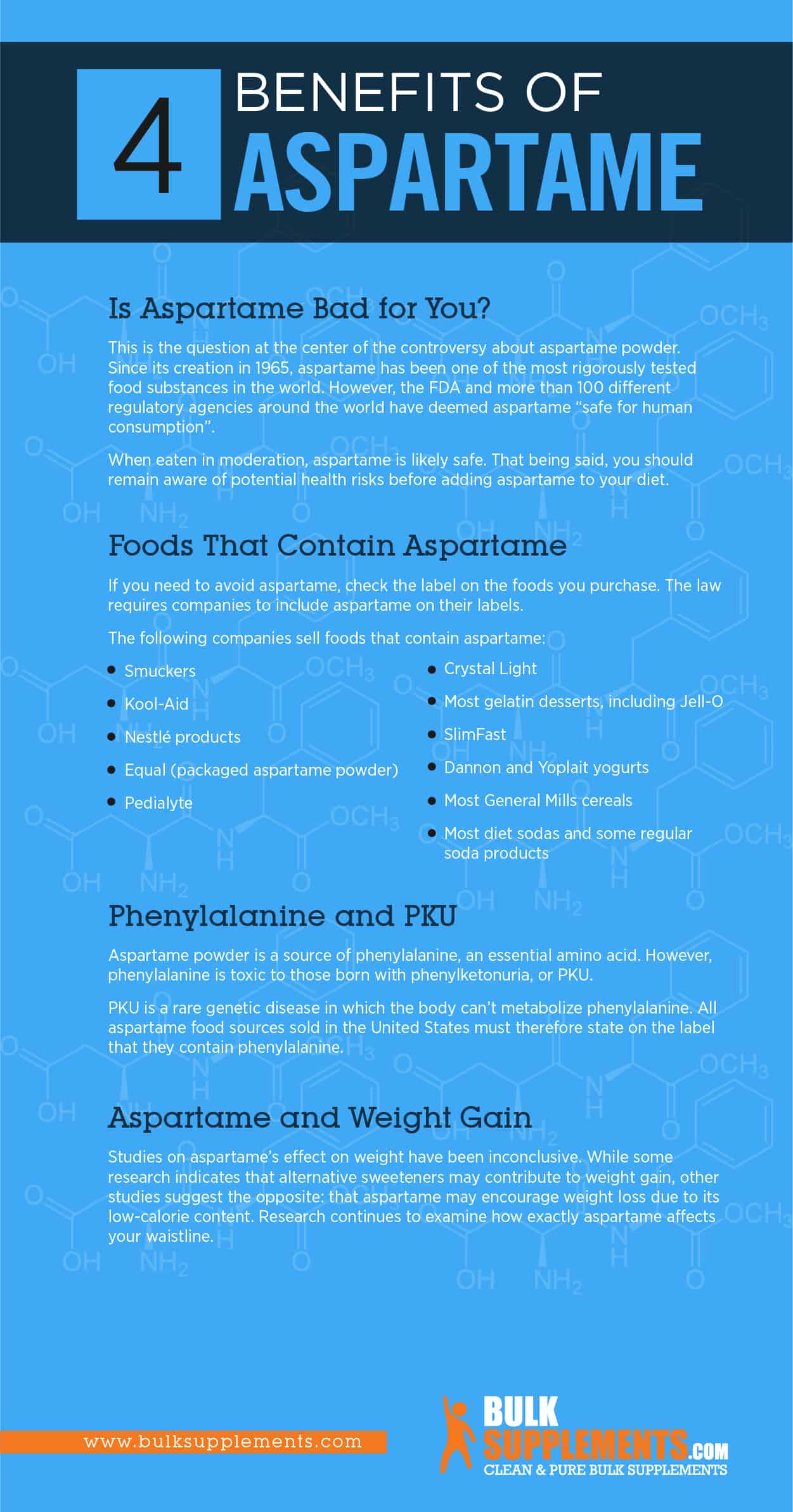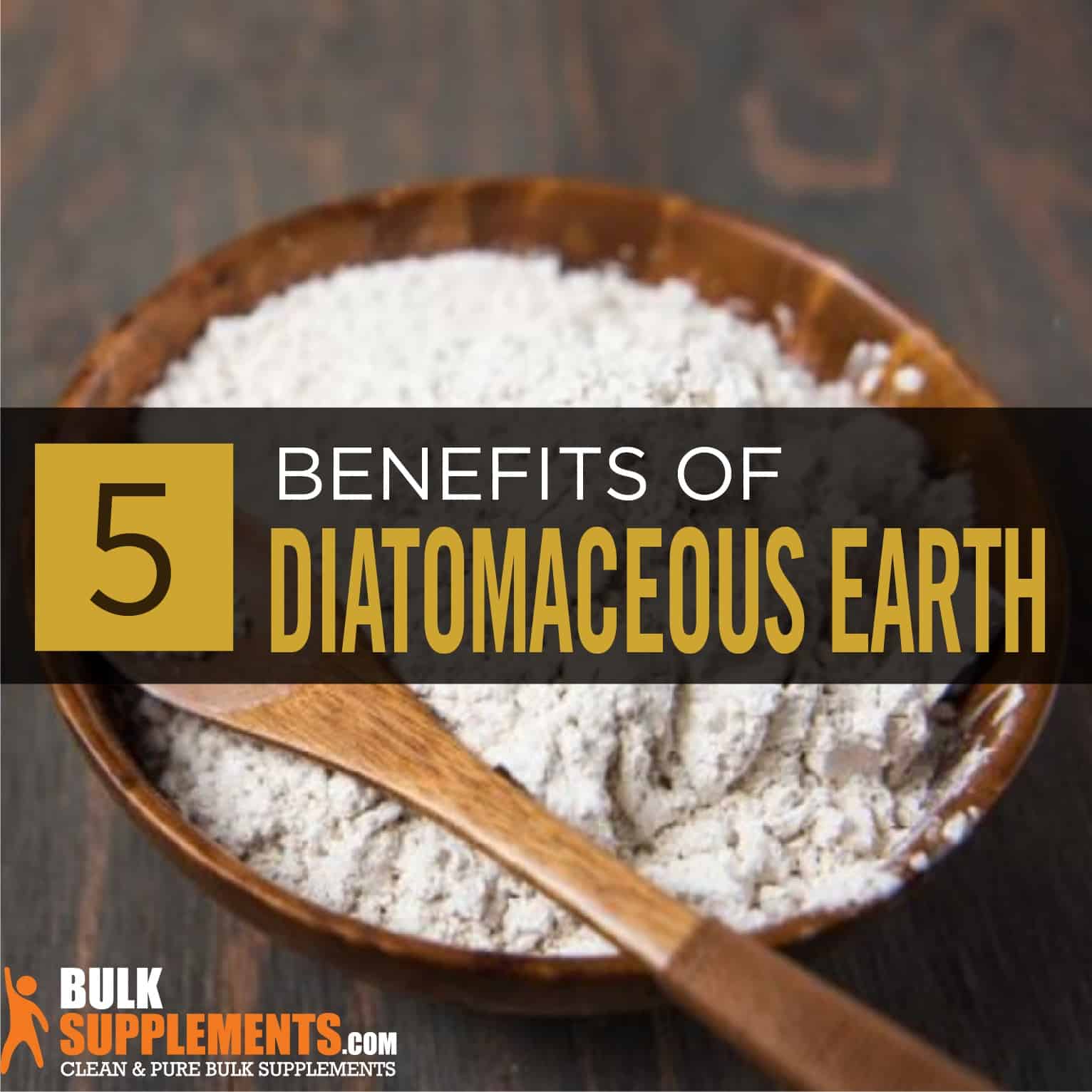Aspartame: Benefits and Side Effects
by James Denlinger Digital Marketing StrategistWhat is Aspartame?
Aspartame powderis a calorie-free artificial sweetener found in diet soft drinks and other sugar-free products. While aspartame is an FDA-approved, low-calorie sugar alternative, you should only consume it in moderation. Several studies have linked long-term consumption to potential health problems.
Aspartame contains aspartic acid and phenylalanine, both naturally- occurring amino acids. Sold under the brand names NutraSweet and Equal, it’s one of the most popular sweeteners used in packaged foods, especially in “diet” foods.
Aspartame is at least 200 times sweeter than sucralose, or traditional table sugar. Since it’s so sweet, you only need a minuscule amount of aspartame to sweeten foods, which is why the calorie count is so low.
Is Aspartame Bad for You?
This is the question at the center of the controversy about aspartame powder. Since its creation in 1965, aspartame has been one of the most rigorously tested food substances in the world. However, the FDA and more than 100 different regulatory agencies around the world have deemed aspartame “safe for human consumption”.
When eaten in moderation, aspartame is likely safe. That being said, you should remain aware of potential health risks before adding aspartame to your diet.
 PIN IT
PIN ITHealth Risks of Aspartame
The FDA cites many of the aspartame health risk claims as hoaxes. However, aspartame may negatively affect some individuals with pre-existing conditions, or those who consume high amounts for prolonged periods of time.
Phenylalanine and PKU
Aspartame powder is a source of phenylalanine, an essential amino acid. However, phenylalanine is toxic to those born with phenylketonuria, or PKU.
PKU is a rare genetic disease in which the body can’t metabolize phenylalanine. All aspartame food sources sold in the United States must therefore state on the label that they contain phenylalanine.
Aspartame and Weight Gain
Studies on aspartame’s effect on weight have been inconclusive. While some research indicates that alternative sweeteners may contribute to weight gain, other studies suggest the opposite: that aspartame may encourage weight loss due to its low-calorie content. Research continues to examine how exactly aspartame affects your waistline.
Aspartame Consumption on a Ketogenic Diet
Since many artificial sweeteners like aspartame have few calories, they’re popular in diets like the ketogenic diet.
A ketogenic diet activates ketosis, a state of starvation that forces your body to burn fat for energy instead of glucose. Ketogenic diets favor high-fat foods and limit carb and sugar consumption. Proponents maintain that keto diets promote significant weight loss by training the body to burn fat for fuel.
Aspartame may act as a triggering agent that will knock your body out of ketosis. This means that consuming aspartame while on a ketogenic diet could counteract the diet’s effects. However, research is limited on aspartame’s relation to ketosis. You should always consult your doctor before adopting any diet plan, and before taking alternative sweeteners.
Foods That Contain Aspartame
If you need to avoid aspartame, check the label on the foods you purchase. The law requires companies to include aspartame on their labels.
The following companies sell foods that contain aspartame:
- Smuckers
- Kool-Aid
- Nestlé products
- Equal (packaged aspartame powder)
- Pedialyte
- Crystal Light
- Most gelatin desserts, including Jell-O
- SlimFast
- Dannon and Yoplait yogurts
- Most General Mills cereals
- Most diet sodas and some regular soda products
Alternatives to Aspartame
Other alternative sweeteners are available if you prefer to avoid aspartame, including:
- Brown rice syrup
- Erythritol powder
- Sugar cane
- Stevia extract powder
- Agave nectar
- Coconut syrup
- Monk fruit extract powder
- Xylitol crystals
Diet Sodas Without Aspartame
Since it’s such a widely-used artificial sweetener, it can be challenging to find sodas that don’t contain aspartame. Listed below are some of the diet sodas that don’t use aspartame (although most include other forms of artificial sweeteners):
- Bai Bubbles (sweetened with erythritol)
- Diet Rite (sweetened with a mix of sucralose and acesulfame potassium)
- Virgil’s Zero sodas (sweetened with stevia)
- Zevia soda products (sweetened with stevia)
- Diet Coke with Splenda (sweetened with a mix of sucralose and acesulfame potassium)
- Hansen’s diet soda (sweetened with a blend of sucralose and acesulfame potassium)
- Diet Shasta (sweetened with a blend of sucralose and acesulfame potassium)
Chewing Gum Without Aspartame
Once a go-to ingredient in chewing gum, aspartame is falling out of favor with many chewing gum brands due to consumer demand. Chewing gum brands such as Spry Gum (sweetened with xylitol), Dentyne Classic (no artificial sweetener) and Wrigley’s Airwaves Menthol (no artificial sweeteners) have all opted to ditch aspartame and use other natural flavorings instead.
The Bottom Line
The FDA and multiple other regulatory bodies have cleared aspartame as a safe alternative sweetener. However, you should always talk to your doctor to ensure it won’t negatively affect your health, especially if you have PKU or other health conditions. If you would like to avoid aspartame, you can try plenty of other natural, low-calorie sweeteners.
Sponsor Ads
Created on Apr 11th 2020 18:47. Viewed 527 times.




